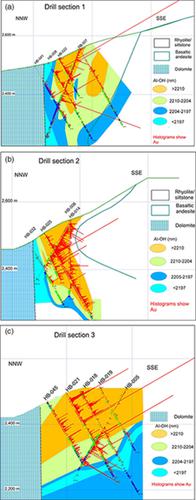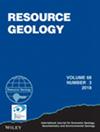蒙古汗阿尔泰金矿床地质、成矿作用及短波红外蚀变填图
IF 0.8
4区 地球科学
Q3 GEOLOGY
引用次数: 0
摘要
可汗阿尔泰金矿位于蒙古西南部新元古代—寒武系湖泊地形的N缘附近,距其与元古代—太古代Baydrag克拉通接触约5 km,位于晚寒武世侵位的Khantaishir蛇绿岩东南18 km处。寄主岩变形变质强烈,为下绿片岩相,年龄不确定。它们包括一系列流纹岩火山碎屑和斑岩流,与层状粉砂岩、玄武岩安山岩互层,并与白云岩断裂。低品位金矿化(高达2 ppm Au)主要存在于流纹岩火山岩中,面积约为1100 × 160 m,垂直范围约为200 m。它与浸染的黄铁矿(2-10%体积)有关,但包括与厘米宽的石英原生金黄铁矿脉相关的高品位带(1米内高达183 ppm)。金矿化带还包括VMS矿化(目前程度较低),其特征是块状黄铁矿-闪锌矿透镜体和石英-黄铜矿带状带。一个更大的VMS矿床(Ereen Budagt,约1000万吨硫化物矿石)在距离SSE 6公里的类似地质环境中被发现。主要蚀变组合为石英-白云母-钠长石,次要有碳酸盐、绿泥石、绿帘石-放光石和叶蜡石-一水硬铝石-碟辉石蚀变。金矿化与强构造片理带和腐殖白云母的形成有关,向外分带为高铝白云母。黄铁矿为典型的自面体,呈同心圆生长带,并有石英压影包裹片理,与变质变形过程中的同生生长一致。其他硫化物包括毒砂、闪锌矿和可能的马氏铁矿。初步LA必经ICPMS映射显示黄铁矿钢圈在非盟丰富,,,铜、镍、铅、Ag)、莫和Se,黄铁矿核心公司丰富,Bi, Te,和流纹岩母岩富集在K,英航,V和Tl。整个流纹岩岩石地球化学的玄武安山岩,显示N量为玄武岩安山岩MORB特征,以及对所有岩石俯冲签名,和高分别以(~ 8%),二氧化钛(~ 1%)和低镍、铬含量玄武岩,兼容背弧构造背景。本文章由计算机程序翻译,如有差异,请以英文原文为准。

Geology, mineralization and short wave infrared alteration mapping of the Khan Altai Au deposit, Mongolia
Khan Altai Au deposit is located near the N margin of the Neoproterozoic‐Cambrian Lake terrain in SW Mongolia, about 5 km from its contact with the Proterozoic‐Archean Baydrag craton, and 18 km SE of the Khantaishir ophiolite, which was emplaced in the Late Cambrian. The host rocks are strongly deformed and metamorphosed to lower greenschist facies, and of uncertain age. They comprise a sequence of rhyolitic volcaniclastics and porphyritic flows interbedded with laminated siltstone, basaltic andesite and faulted against dolomite. Low‐grade gold mineralization (up to 2 ppm Au) is hosted mainly in rhyolitic volcanics and extends over an area of about 1,100 × 160 m with a vertical extent of about 200 m. It is associated with disseminated pyrite (2–10% by vol) but includes high‐grade zones (up to 183 ppm Au over 1 m) related to cm‐wide quartz‐native Au‐pyrite veins. The Au mineralized zone also encompasses VMS mineralization (currently of minor extent), characterized by massive pyrite‐sphalerite lenses and quartz‐chalcopyrite stringer zones. A larger VMS deposit (Ereen Budagt, about 10 Mt sulfide ore) is found 6 km to the SSE in a similar geological setting. The main alteration assemblage is quartz‐white mica‐albite, but with minor carbonate, chlorite, epidote‐actinolite and pyrophyllite‐diaspore‐dickite alteration. Gold mineralization is related to zones of strong tectonic foliation and formation of phengitic white mica, with an outward zonation to high Al white mica. Pyrite is typically euhedral, and exhibits concentric growth zones, as well as quartz pressure shadows to enclosing foliation, consistent with syngenetic growth during metamorphism and deformation. Other sulfides include arsenopyrite, sphalerite and possible marcasite. Preliminary LA‐ICPMS mapping shows pyrite rims are enriched in Au, As, Co, Cu, Ni, Pb, Ag, Mo and Se, the pyrite core is enriched in Co, Bi, Te, and rhyolitic host rock is enriched in K, Ba, V and Tl. Whole rock geochemistry of basaltic andesite to rhyolite, shows N‐MORB characteristics for basaltic andesite, as well as a subduction signature for all rocks, and high MgO (~8%), TiO2 (~1%) and low Ni, Cr content in basalt, compatible with a back arc tectonic setting.
求助全文
通过发布文献求助,成功后即可免费获取论文全文。
去求助
来源期刊

Resource Geology
地学-地质学
CiteScore
2.30
自引率
14.30%
发文量
18
审稿时长
12 months
期刊介绍:
Resource Geology is an international journal focusing on economic geology, geochemistry and environmental geology. Its purpose is to contribute to the promotion of earth sciences related to metallic and non-metallic mineral deposits mainly in Asia, Oceania and the Circum-Pacific region, although other parts of the world are also considered.
Launched in 1998 by the Society for Resource Geology, the journal is published quarterly in English, making it more accessible to the international geological community. The journal publishes high quality papers of interest to those engaged in research and exploration of mineral deposits.
 求助内容:
求助内容: 应助结果提醒方式:
应助结果提醒方式:


